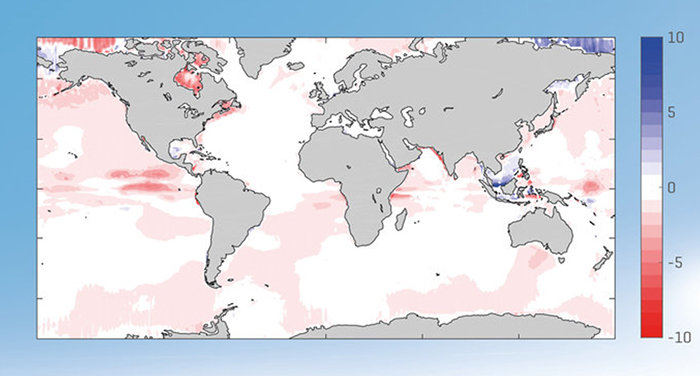The level of oxygen in our oceans has dropped over the past half-century, and human activity such as burning fossil fuels and dumping fertilisers in the sea is to blame, according to a new study.
Researchers studied five decades of data in the most comprehensive survey of ocean oxygen levels ever carried out, and found that the amount of oxygen in the world's oceans has reduced by 2 percent.
Scientists from the GEOMAR Helmholtz Centre for Ocean Research in Germany describe the drop as "non-critical" so far, but warn that it could have major consequences for marine creatures, which rely on oxygen to survive, just like us land-dwellers.
"While the slight decrease of oxygen in the atmosphere is currently considered non-critical, the oxygen losses in the ocean can have far-reaching consequences because of the uneven distribution," explains oceanographer Lothar Stramma.
"For fisheries and coastal economies this process may have detrimental consequences."
 Oxygen drop in percentages across the world, 1960-2010. Credit: GEOMAR
Oxygen drop in percentages across the world, 1960-2010. Credit: GEOMAR
Hundreds of thousands of historical and contemporary ocean oxygen measurements were combined for the new research, including data from remote regions and the deep sea – the lowest layer of the ocean – where detailed recordings are less easy to obtain.
"We were able to document the oxygen distribution and its changes for the entire ocean for the first time," says another of the team, Sunke Schmidtko.
"These numbers are an essential prerequisite for improving forecasts for the ocean of the future."
As temperatures rise across the world, the process kicks off a chemical reaction under the sea: warmer water is less efficient at trapping gases like oxygen, which means it escapes into the atmosphere.
Warmer water is also lighter and expands more, so less oxygen is making its way down to the lower depths of the ocean.
On top of the overall drop in oxygen levels, the researchers found that the amount of water with no oxygen in it at all has quadrupled since 1960.
The biggest drop was in the North and Equatorial Pacific oceans, which alone accounted for nearly 40 percent of the overall 2 percent slide.
All of this is bad news for anything that lives under the sea, and our planet's finely balanced ecosystem as a whole.
As the phenomenon continues, more regions of the ocean are likely to become uninhabitable, the researchers predict, which leads to fragmented zones of life and extra pressure on underwater species.
The researchers warn that "far-reaching implications for marine ecosystems and fisheries can be expected", and based on the existing trend, estimate a further drop in the oxygen level of between 1 to 7 percent between now and 2100.
If the team's prediction is correct, it's another example of why we need to get a grip on climate change asap.
As we've seen from things like humankind's inadvertent use of the ocean as a rubbish tip, the harm we cause to global waters can have a knock-on effect on us – whether that's through introducing toxins into the food chain, or warming oceans affecting global weather patterns.
The good news here is that scientists now have more data than ever before to figure out what's going on, and how we need to respond - and the investigations don't stop here.
"We hope to obtain further data on regional development which will also help us to better understand the global trends," says Stramma.
The research has been published in Nature.
